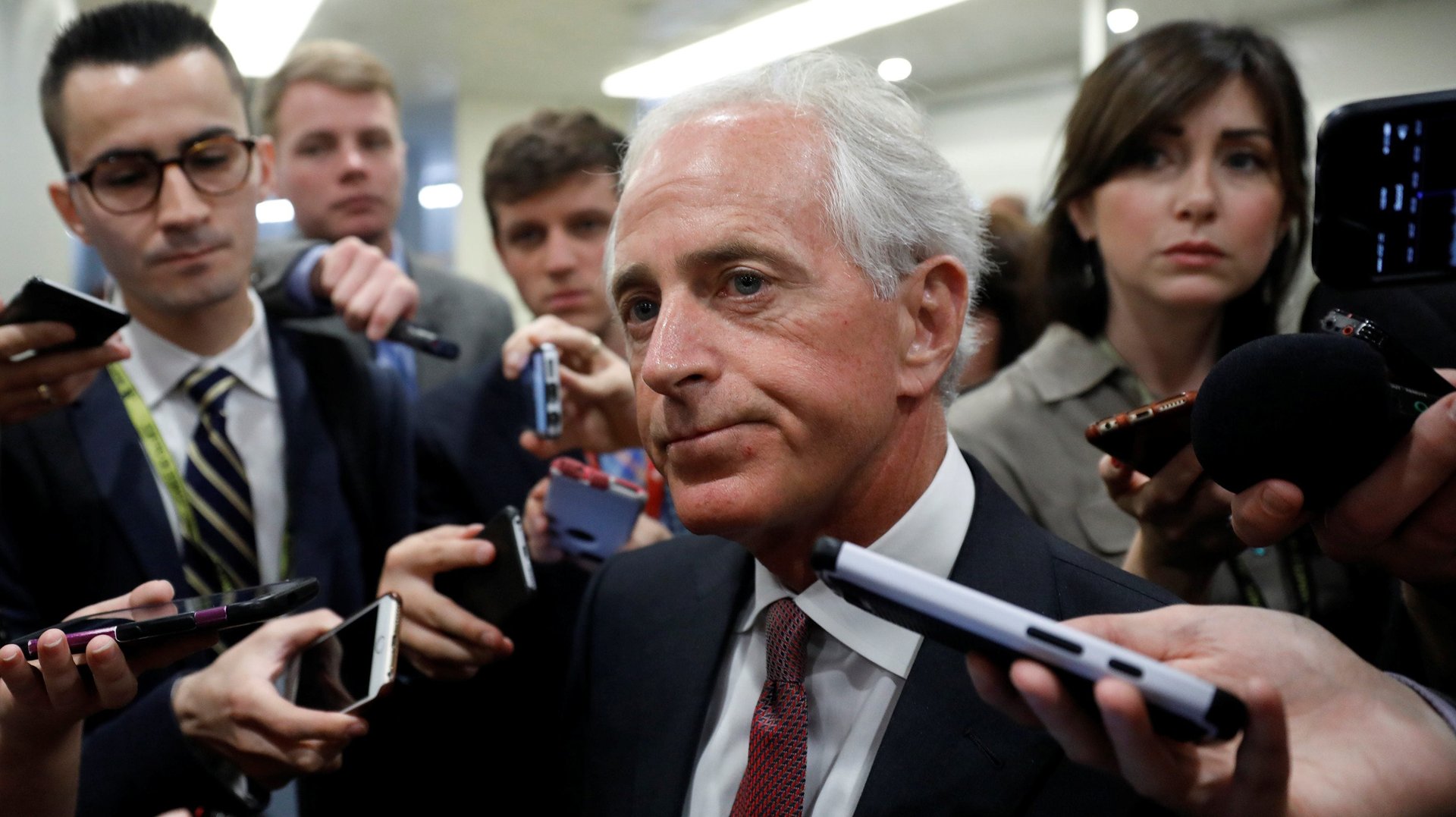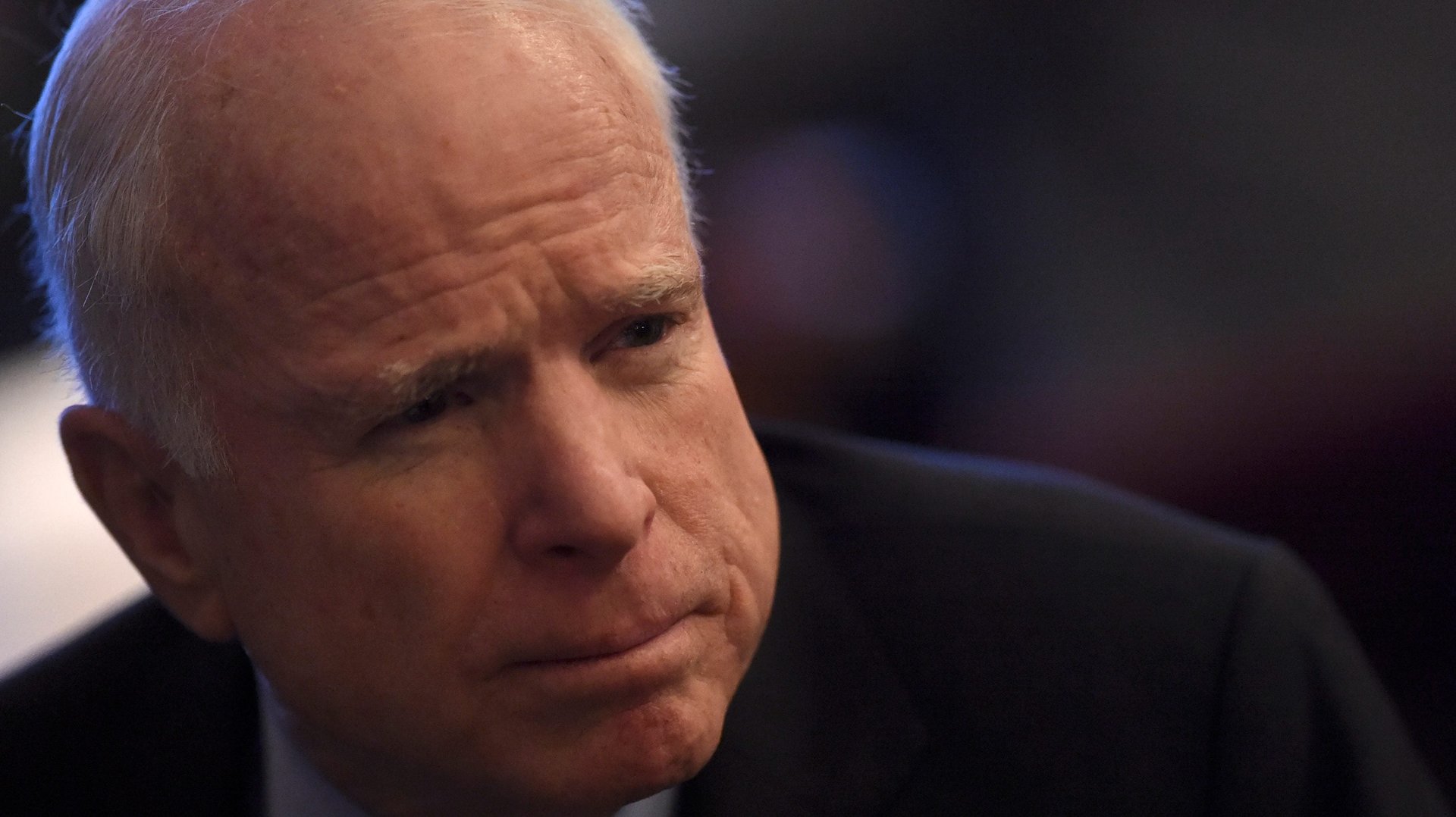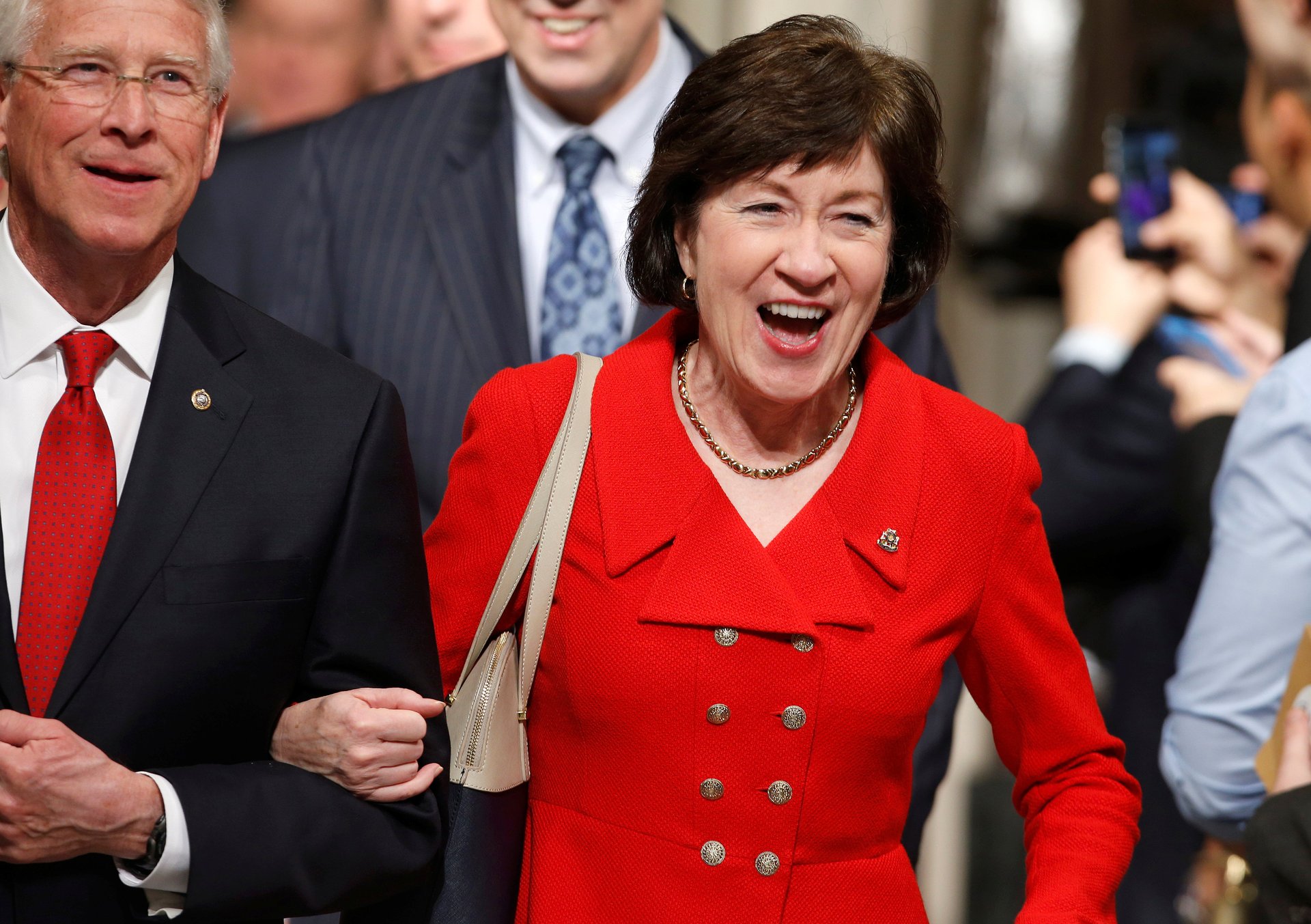The fate of the American republic is in the hands of these Republicans in Congress
US Republicans on Capitol Hill have mostly shrugged their way through the White House’s terrible last week, confining their reactions to the abrupt firing of FBI chief James Comey and reported intelligence slip-up of president Donald Trump to a handful of strongly worded statements. Meanwhile, investigations into Russia’s meddling in the last US presidential election are moving at a glacial past, despite warnings from the US’s top intelligence agents.


US Republicans on Capitol Hill have mostly shrugged their way through the White House’s terrible last week, confining their reactions to the abrupt firing of FBI chief James Comey and reported intelligence slip-up of president Donald Trump to a handful of strongly worded statements. Meanwhile, investigations into Russia’s meddling in the last US presidential election are moving at a glacial past, despite warnings from the US’s top intelligence agents.
But a New York Times report late Tuesday afternoon (May 16) that Comey has a paper trail documenting Trump’s request that the FBI drop the investigation into former national security advisor Michael Flynn’s Russia ties may have finally galvanized some members of the GOP into action.
The scenario, if true, raises the prospect that Trump may have obstructed justice, which could eventually lead to impeachment charges. While pundits increasingly warn of an impending constitutional crisis—whatever that means—calls are coming from all corners for Republicans in Congress to “save the Republic.”
That’s because, with a majority in both the House and Senate, at least until the 2018 mid-term elections, Republicans in Congress are the politicians with the power to demand more accountability from the White House. They run the committees with oversight of the executive and judiciary branch, including the ones investigating Russia’s meddling into the US election and vetting Trump’s new FBI director pick; they will cast deciding votes on the budget that eventually funds the federal government next year.
And they’re the ones who would need to break with their president to start the impeachment process, it if comes to that, in numbers that still seem unlikely currently.
Previously, Republicans’ tepid response to Trump gaffes has been compared to the politicians who take money from the US’s powerful gun lobby, and then offer little more than their “thoughts and prayers” after a mass shooting. But as more and more Americans wonder whether Trump is still fit to hold office, here are a handful of Republicans who may be readying more substantial responses:
Jason Chaffetz
Just 24 hours ago, the Utah Congressman seemed firmly in Trump’s corner. The head of the House Oversight Committee has been so reluctant to investigate Russia’s interference in the US election that Democrats on the committee privately joked to reporters that he’d “gone into hiding.”
But, Chaffetz sprang into action last night (May 16), penning a letter to the FBI demanding any “memoranda, notes, summaries, and recordings” referring to conversations between Comey and the president. Given the high-profile nature of the situation, it is going to be hard for Chaffetz to file the letter and then fail to pursue the request (which happened to previous requests for information from the White House in relation to Flynn).
John McCain

The Republican senator from Arizona, who Trump once said wasn’t a war hero because he had been captured in battle, has still voted with the president nearly 93% of the time since the inauguration, according to FiveThirtyEight’s excellent “Tracking Congress in the Age of Trump” calculator.
But on May 10, McCain unexpectedly voted against a Trump-supported bill to roll back methane emissions rules following a heated discussion on the Senate floor believed to be related to Comey’s firing. Because Republicans hold just a 52-48 majority in the Senate, McCain’s vote essentially shut down the bill, a rare defeat for Trump’s sweeping rollbacks of Obama-era regulations.
McCain’s term ends in six years, when he turns 86, and he’s not expected to run again, leaving many wondering if he’ll embrace the carefully crafted “Maverick” image in his final years in office and help lead the conservative resistance against Trump. Speaking at a Republican party event on Tuesday evening, McCain added fuel to that theory, saying that scandals around the Trump administration had reached a “Watergate size and scale.”
Richard Burr
The North Carolina senator heads the Senate intelligence committee, which is conducting what insiders believe to be the most thorough Congressional investigation into Russian influence.
A former Trump campaign advisor, Burr admitted in February that he had called reporters to downplay reports of links between the Trump presidential campaign and Russia. However, the committee moved to subpoena Micheal Flynn last week, and Burr said he was trying (so far unsuccessfully) to obtain more information about Trump’s conversations in the Oval Office on May 16, before the Comey paper trail story broke. On May 17, the Burr and the commission co-chair said they had invited Comey to testify.
A key aspect of the committee’s work is to help provide the public with more details, context, and information about potential Russian threats, backing up the report issued (pdf) by a cross-section of US intelligence agencies this January.
Burr is also not seeking reelection, and Trump beat presidential rival Hillary Clinton by a relatively small margin in North Carolina, meaning his constituents aren’t likely to beat him up at home for clashing with the president.
Lindsey Graham
Sometimes a sharp critic of Trump, including during the Muslim travel ban debate in January, the South Carolina senator has asked Comey to testify in front of a public session of the Judiciary committee, on which Graham sits. Comey previously refused to testify in front a closed-door session of the Senate. If the former FBI director accepts Graham’s invitation, his testimony could prove explosive.
Susan Collins

The senator from Maine and member of the Senate intelligence committee said Tuesday morning “it would be very troubling” if it were true that Trump shared sensitive information with the Russians, and called for the intelligence committee to be briefed immediately.
Not exactly a fan of the president, Collins called Trump unfit to be executive before the election, and was one of just two Republican senators to vote against the confirmation of Trump’s education secretary Betsy DeVos. She also voted against the president’s EPA pick Scott Pruitt. She has vowed to tear apart the House’s Obamacare repeal bill and start “from scratch.”
Despite the highly partisan Congress, Collins is known for working with her colleagues across the political aisle, and was recently ranked the most bipartisan senator for the fourth year in a row. Her habit of crossing party lines has lead some fellow Republicans to label her, privately, a traitor, but it’s also made her a “resistance” folk hero in Maine, where the other senator is an independent.
Collins’s next steps politically are uncertain—she has two more years in her senate term, but is considering a run for governor in 2018.
Bob Corker
Once considered a possible running mate for Trump, Corker was unstinting in his criticism of the White House this week, saying even before the Comey memo report that the White House appears to be in a “downward spiral,” a problem he said was created by a “lack of discipline.”
As the chairman of the Senate foreign relations committee, Corker seems to be taking the threat of external influence in Western politics seriously, and is a vocal supporter of USAID programs that Trump has vowed to cut. He represents, however, a state where Trump won by a 26% margin, meaning vocal criticism of the president could cost him his seat in 2018. Trump has vowed to “fight” Republicans who cross him in the mid-term elections.
Lisa Murkowski
Like Collins, Alaska’s senator voted against DeVos’s confirmation. Murkowski has also pledged to vote against any health care bill that defunds Planned Parenthood, and has criticized some of the deep cuts in Trump’s budget proposal. The senator practices an “Alaska first” manta, which means she isn’t as tied to the Republican party line, staffers like to say. As chairman of the Senate energy and natural resources committee, she is under pressure not to confirm Trump’s recent Federal Energy Regulatory Committee nominees from environmental and green energy groups until ties between the administration and Russia are examined.
Justin Amash
The conservative Michigan Republican representative is one of the few House Republicans who have frequently criticized Trump. He joined a Democrat-sponsored bill in the House calling for an independent commission to be appointed in the Russian investigation this month (it has not been voted on yet) and wants Congress to be briefed by the White House on the details of what Trump shared with Russian visitors to the Oval Office. This morning he became the first Republican to suggest Trump could be impeached, saying the report about Trump’s meeting with Comey would be grounds for impeachment if true.
* * *
Congressional Democrats have been demanding Trump’s impeachment since before he entered office, and public support for impeachment hit a new high this week. But, until “Trump’s staying on in office would have to be a bigger threat to Republican majorities than his removal,” as political analyst Jonathan Leiber wrote in Quartz earlier, it is unlikely to happen. That’s why so many people will be closely watching the actions of this handful of Congressional Republicans in the coming days and weeks.